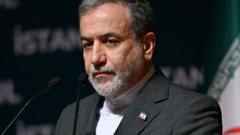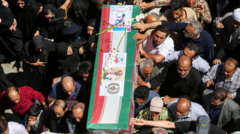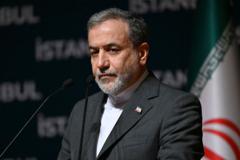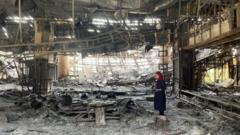Abbas Araghchi, Iran’s foreign minister, confirmed "excessive and serious" damage to nuclear sites following recent bombings, contrasting with Ayatollah Khamenei's claims of minimal disruption. As nuclear negotiations remain stalled, Iran's parliament has advanced a bill that could hinder cooperation with international nuclear inspectors, further complicating diplomatic relations.
Iran Acknowledges Significant Damage at Nuclear Sites Amidst Ongoing Tensions

Iran Acknowledges Significant Damage at Nuclear Sites Amidst Ongoing Tensions
Iran's foreign minister reveals extensive damage to nuclear facilities due to US and Israeli bombings, in stark contrast to the Supreme Leader's remarks.
Iran's Foreign Minister Abbas Araghchi publicly acknowledged the severe damage inflicted on the nation's nuclear sites due to recent bombings by the United States and Israel. Speaking to a state broadcaster, he described the extent of the damage as "excessive and serious" on Thursday night. This statement comes amidst a backdrop of contradicting claims from Iran's Supreme Leader, Ayatollah Ali Khamenei, who asserted earlier that the strikes did not significantly disrupt Iran’s nuclear program. Khamenei, who has largely maintained a low profile since the onset of the conflict with Israel, described US President Donald Trump’s assertions of "total obliteration" of nuclear sites as exaggerated, asserting a narrative of victory over the US and Israel.
The stark difference between Araghchi's admission and Khamenei's reassurances points to a potential rift in Iran's communication strategy regarding the impact of foreign attacks. Araghchi further indicated that there would be no immediate plans to resume nuclear negotiations with the US. The Iranian government had previously canceled what would have been the sixth round of talks following Israel's military actions, and Araghchi emphasized a need to reassess diplomacy, although the specifics of this new approach were not disclosed.
In a controversial legislative move, Iran's parliament approved a bill that aims to halt cooperation with the International Atomic Energy Agency (IAEA), which, if enacted, would signify Iran's withdrawal from commitments to allow nuclear inspections of its facilities. Israel's stance on the attacks emphasizes a preemptive need to thwart what it perceives as Iran's ambitions to develop nuclear weapons, which Iran has consistently denied, maintaining that its nuclear efforts are strictly for civilian purposes.
The military engagement saw the US directly involved last weekend, targeting facilities in key sites such as Fordo, Natanz, and Isfahan, with US Defence Secretary Pete Hegseth stating that the strikes had significantly hindered Iran's nuclear advancements. However, a leaked Pentagon report contradicted that assessment, suggesting the damages would only result in a temporary setback of a few months, a claim that the administration dismissed.
As violence continues, Iran's health ministry reported 610 fatalities in the wake of the airstrikes, while Israeli sources reported 28 casualties, highlighting the heavy toll on both sides of the conflict. The uncertainty surrounding Iran's nuclear ambitions and international relations remains a contentious issue as internal and external pressures mount in a region besieged by conflict and instability.





















